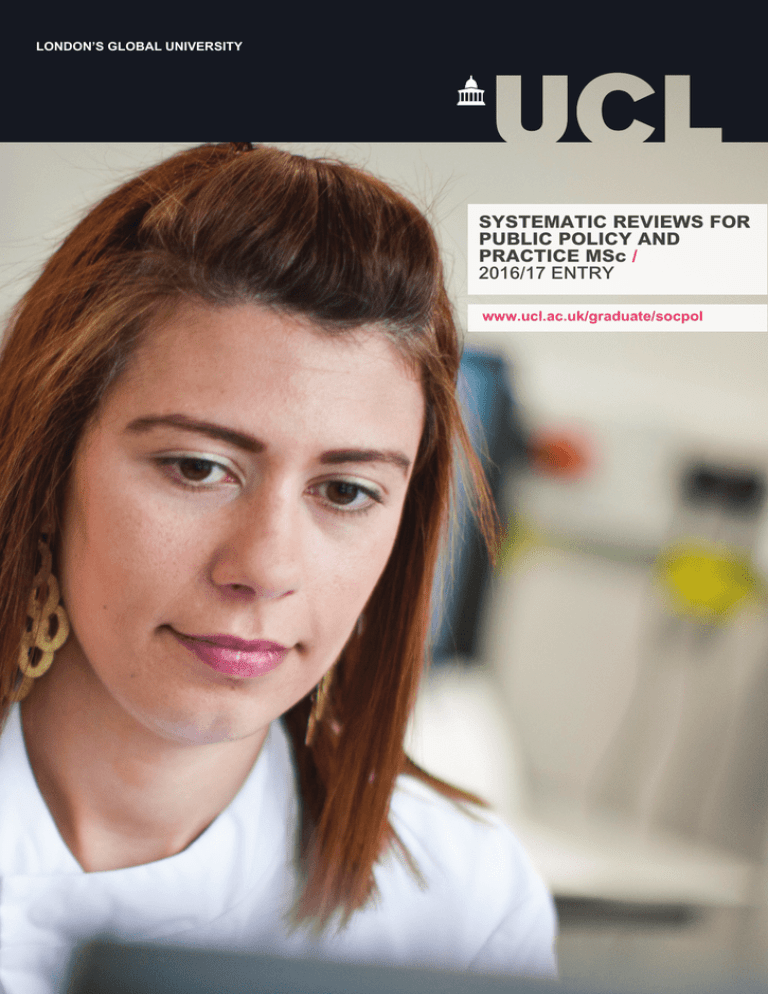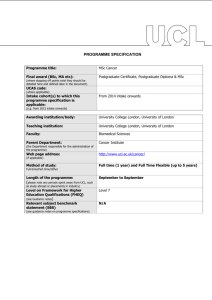SYSTEMATIC REVIEWS FOR PUBLIC POLICY AND PRACTICE MSc /
advertisement

LONDON’S GLOBAL UNIVERSITY SYSTEMATIC REVIEWS FOR PUBLIC POLICY AND PRACTICE MSc / 2016/17 ENTRY www.ucl.ac.uk/graduate/socpol Systematic Reviews for Public Policy and Practice MSc / The Systematic Reviews for Public Policy and Practice MSc equips students to work with the increasing number of national and international organisations committed to evidence-informed policy and practice. Students learn alongside early career and experienced researchers, policymakers and practitioners from a diverse set of policy sectors and disciplines. Degree summary The programme will enable you to plan and appraise a systematic review of research in any policy area, to develop a critical appreciation of the full diversity of review approaches and types of research use, and equip you with understanding and skills to help ensure perspectives from the public, practitioners, policymakers and researchers are all considered in research and policy development. // You will learn from research-active tutors based at the IOE’s EPPI-Centre, which is recognised worldwide for its development of methods for diverse kinds of systematic review, for the production of policy-relevant research, and for research into perspectives and participation. The programme is unique in the way that students study systematic reviews of both qualitative and quantitative data, and a full range of review designs. // The programme can be taken entirely at a distance, or with some face-to-face learning, and so attracts students from across the globe, many of whom are already working for research-focused or policy-making organisations. This programme is delivered via online learning or mixed mode (face-to-face daytime workshops with online learning). It is assessed by coursework assignments and a 20,000-word dissertation. Degree structure Mode: Full-time: 1 year; Flexible: up to 4 years Students undertake modules to the value of 180 credits. The programme consists of three core modules (90 credits), one optional modules (30 credits), and a dissertation (60 credits). CORE MODULES // Research Engagement, Participation and Impact // Systematic Reviews: Diversity, Design and Debate // Social Theory OPTIONS // Students select one option from a wide range of UCL Institute of Education Master's modules. DISSERTATION/REPORT // All students undertake an independent research project which culminates in a 20,000-word dissertation. Your career Graduates of this programme are currently working across a broad range of areas, for example one is a project director in mobile technology for learning, while another is a social research manager advising national government. Another graduate works as a senior editor of systematic research reviews. Employability Students completing the programme are equipped with enhanced critical thinking skills and, in particular, skills for research design and appraisal, spanning a full range of research purposes and problems. Entry requirements Normally a minimum of an upper second-class Bachelor's degree from a UK university or an overseas qualification of an equivalent standard is required. English language proficiency level If your education has not been conducted in the English language, you will be expected to demonstrate evidence of an adequate level of English proficiency. The level of English language proficiency for this programme is: Special. Only the IELTS or a pass to the required standard in the Institute of Education's pre-sessional English (PASHE) course are accepted. If taking IELTS, applicants must obtain an overall grade of 7.0 with a minimum of 6.5 in the reading subtest and 6.0 in the writing subtest.. FEES AND FUNDING // UK & EU (2016/17) entry: £7,145 (FT) // Overseas (2016/17) entry: £15,525 (FT) Fees note: Fees for flexible, modular study are charged pro-rata to the appropriate full-time Master's fee taken in an academic session. Applicants may be eligible to apply for funding from the Economic and Social Research Council via the Bloomsbury Doctoral Training Centre. The MSc provides Master's-level postgraduate training which can constitute the first year of ESRC 1+3 postgraduate PhD studentships. Full details of funding opportunities can be found on the UCL Scholarships website: www.ucl.ac.uk/scholarships APPLICATION DATE Information about the evidence required, acceptable qualifications and test providers is provided at: www.ucl.ac.uk/graduate/english-requirements All applicants: 29 July 2016 Your application Mr David Fowkes The deadline for all applicants is 29 July 2016. CONTACT Email: d.fowkes@ucl.ac.uk Telephone: +44 (0)20 7612 6271 Students are advised to apply as early as possible due to competition for places. Those applying for scholarship funding (particularly overseas applicants) should take note of application deadlines. When we assess your application we would like to learn: // why you want to study Systematic Reviews for Public Policy and Practice at graduate level // why you want to study Systematic Reviews for Public Policy and Practice at UCL // // what particularly attracts you to the chosen programme // where you would like to go professionally with your degree how your academic and professional background meets the demands of this challenging programme Together with essential academic requirements, the personal statement is your opportunity to illustrate whether your reasons for applying to this programme match what the programme will deliver. Details on how to apply are available on the website at: www.ucl.ac.uk/graduate/apply PDF Updated: May 26, 2016 Information correct at time of going to press. See website (www.ucl.ac.uk/ioe/departments-centres/departments/social-science) for latest information



